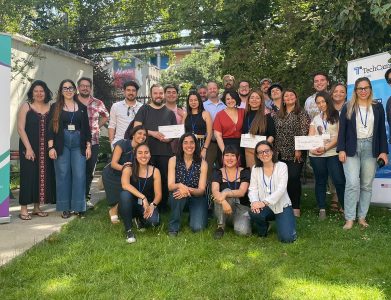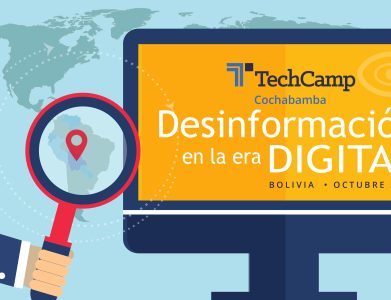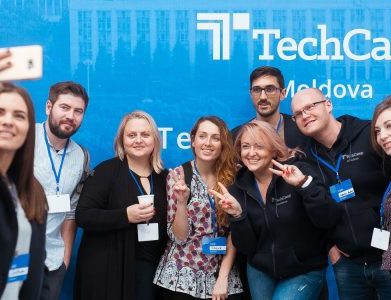In the autumn of 2022, we convened 52 leaders for TechCamp Cochabamba focusing on “Disinformation in the Digital Age.” Disinformation is on the rise in Latin America and includes efforts by China, Russia, Venezuela, Cuba, and other actors. Additionally, the government of Bolivia and other political actors have engaged in significant anti-U.S. disinformation campaigns. At the same time, emerging influencers are actively disseminating news and information online, though they sometimes lack the knowledge and tools to sift fact from fiction. Where better than Cochabamba for participants from Bolivia, Ecuador, Paraguay, Peru, and Venezuela to join forces with trainers from the United States and Latin America to tackle this problem? It was the perfect backdrop to develop innovative ideas for combatting disinformation in the region.
In preparation for the TechCamp, participants joined virtual training sessions in the weeks before traveling. Sessions featured speakers from the National Democratic Institute (NDI) for Latin America and the Caribbean based out of Washington, D.C., and from the Department of State’s Public Diplomacy Desk Officer for Andean Affairs to talk about how the State Department counters disinformation. The preparatory sessions allowed participants to meet in advance and hit the ground running when we gathered in Cochabamba, allowing them to dive directly into disinformation topics and maximize their time together.
On October 27-29, the group assembled! The program included an impressive group of civil society activists, journalists, technology professionals, and practitioners who contributed their experiences to create innovative ideas for combatting disinformation. The three-day in-person workshop featured international trainers including Mayte Ciriaco Ruiz, a data journalism expert from Peru, as well as local Bolivian trainers such as Patricia Cusicanqui Hanssen, Patricio Crooker, and Nicole Hochhauser who use photography and other investigative journalism tactics to inform effective reporting. Working sessions included topics of designing infographics, starting a podcast, and optimizing social media content, among others.
At the conclusion of the event, participants competed for grant funding, pitching the creative ideas they developed during the workshop.
Three final group projects received seed funding totaling $16,000.
The three winners were:
- Super Checkers, a platform for 11-to-15-year-olds to actively verify the information they consume on social networks and to encourage them to be agents of change in their communities;
- InfoBOT, a chatbot for WhatsApp that responds to users in real time to counter fake news/disinformation by verifying news articles; and
- Lupita, a digital platform that promotes the use of the Law on Transparency and Access to Public Information in Peru on issues related to public health, human rights, gender, education and the environment.
The impact of the funded projects is expected to continue long into the future. The Bolivian TechCamp participants were integrated into Inspira Bolivia and the global State Department Exchange Alumni Network, two of the region’s most effective networks on continuing engagement. Together with the American Chamber of Commerce in Bolivia and the U.S. Embassy in La Paz, TechCamp organizers will continue to build relationships between participants and support the ongoing projects. Even beyond the projects funded through the program, the results of the TechCamp will manifest as a profound ripple in participants’ local communities and a stronger network of like-minded individuals across the region.


